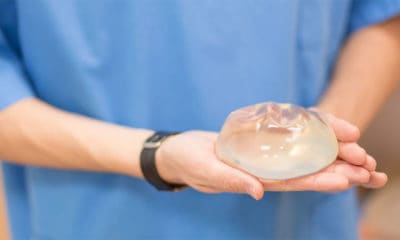How do you know when it’s time to replace your implants? There’s really no hard and fast rule. Many of today’s breast implants can last well past the manufacturers old recommendation of a decade. In fact, implant failure is very rarely what brings a patient in for a breast augmentation revision consultation.
Dr. Caroline Glicksman of Sea Girt, NJ, an expert in breast surgery, has performed thousands of breast augmentations, and because she follows her patients every two years for the life of their implant, she finds that most are making the decision to replace because their bodies are 10 years older. What worked for them at 23 may no longer fit their lifestyle or body at 33. This is one of the many reasons why she feels that the relationship between breast surgeon and patient is a lifelong one.
Patient Education is Vital
When looking for a breast surgeon, it is vital to find one who is going to take the time to really educate you on your options. A great place to start is by looking at the board certified plastic surgeons in your area who have a lot of breast augmentation experience. Dr. Glicksman, for example, spends a great deal of time with a breast patient pre-operatively. She will take up to an hour or more to teach you about:
- Your anatomy – what can or cannot be achieved and why;
- The different implant options, fills, shapes, and cohesivity;
- Implant placement and why your soft tissue coverage matters;
- The safest locations for your incisions; and
- The long-term care for your breast implants and protection against injury and possible infection.
It is only through in-depth education that the patient and surgeon will discover “what’s going to be the best implant for them,” explains Dr. Glicksman. For her, a big part of this education process is helping a prospective patient to understand that “there is a health commitment to getting a breast implant.” You don’t simply get an implant and disappear.
Breast Implants are a Lifelong Commitment
A good plastic surgeon is going to be as focused on your breast health as your breast aesthetic. In order to do that, Dr. Glicksman makes an agreement with her breast augmentation patients that they will come back in to see her every two years to have their implants checked. If patients don’t show up, she will track them down. It’s important for your surgeon to check:
- If you are over 40 that you are getting a yearly mammogram;
- Changes that occur with aging, weight gains and losses, pregnancies, and eventually menopause; and
- The integrity of the breast implant as it ages, by physical exam and in office ultrasound.
“It’s a wonderful part of my practice because I get to see these patients grow up,” says Dr. Glicksman. She recently saw a patient in whom she first placed an implant when the woman was 22. The patient, now in her mid-30’s, had returned after a couple of children ready to discuss changing her implant.
Longevity of Breast Implants
Bottom line: life happens. In Dr. Glicksman’s practice, this is the number one reason that most patients pursue breast implant revision surgery. “If the first implant is sized correctly and remains soft and stable in good position, it can take a young woman through college and grad school, marriage and her first baby before the need to consider a revision,” says Dr. Glicksman.
For older women who have had a few children, an implant and a look that they loved in their early 40’s may not work in their late 50’s after menopause, or moderate weight gain. Life circumstances change, bodies change, and breasts certainly continue to change as women age.
It is important for patients to understand that breast implants don’t last forever. Despite several of the manufacturers implementing changes to their shells, gel fill, and factory specifications, ruptures eventually occur in all implants. Long-term surveillance is recommended by all of the plastic surgery societies, and not just with a family practitioner or an OB-GYN. Plastic surgeons are the best resource for patients, as they are trained to know what to look for, and know when patients should consider replacing their breast implants.
Weight Fluctuations & Implants
One of the main changes that happens with the body over time is weight gain or loss. This may be due to pregnancy, breast feeding, hormonal fluctuations or simply being more sedentary. Regardless, gaining and losing weight stretches out the skin and tissues of your breast. This can affect how your implant sits in the pocket which, in turn, may adversely affect your breast aesthetic.
This can especially true for patients who have a breast implant on the larger side because the heavier the implant, the more strain and stretch it puts on your breast tissue. Also, if you’ve gained some weight your breasts may now look too big for your frame. Many women who come in for breast augmentation revision surgery tend to replace their current implant with a smaller model, some reach a point where they no longer want an implant at all.
Personal Taste Changes
Aside from the physical changes that occur over time, our personal taste changes. What you may have thought was beautiful and “au courant” 15 years ago may look dated and wrong today. This is as true with breast implants as it is with fashion. Sometimes the things you disliked about your body in your 20’s and 30’s may not bother you as much in your 40’s.
In general, Dr. Glicksman likes to tell her breast patients that an implant will probably last ten about years, for all of the reasons discussed. Implants will fail, patient’s bodies will change, and most importantly the way a woman feels about herself evolves as she matures and naturally ages.
A revision procedure can be a relatively simple surgical procedure if the first implant surgery was well planned out, and patients don’t neglect the signs of a complication. Dr. Glicksman advises her patients to return every two years for routine follow-ups so she and her patients can plan well in advance when they think the time for revision is right.




















Facebook
Twitter
Instagram
YouTube
RSS